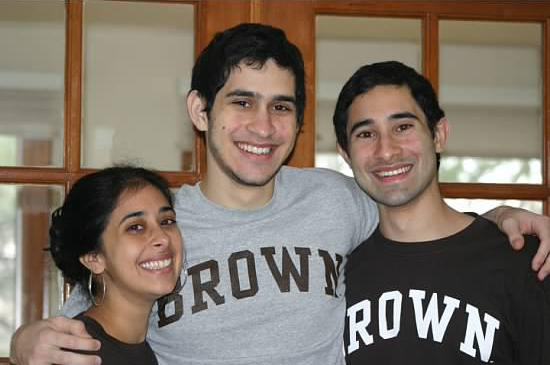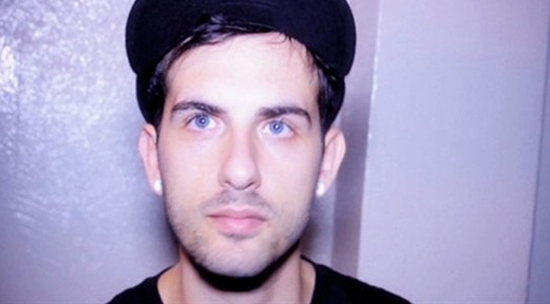by D.S. Wood
D.S. Wood is a Canuck journalist who occasionally takes an interest in news outside the scope of his day job in the mainstream media. He reached out to the family of Sunil Tripathi to get their take on amateur sleuths and mainstream media failing their lost loved one, and spoke with Sangeeta Tripathi, Sunil’s sister, for 45-minutes by phone.

Sunil Tripathi (center) with his sister, Sangeeta Tripathi (left) and brother, Ravi Tripathi (right).
Shaken by bomb blasts in Boston, Sangeeta Tripathi returned to Providence to discover the missing younger brother she’d moved there to find was labeled a suspect.
He was called a terrorist.
He was called a killer.
He was called one of the most wanted men in America.
Sunil Tripathi was none of these things.
He was a 22-year-old student at Brown who left his apartment early in the morning March 16 never to come back.
He was not a terrorist.
He was not a killer.
He was not among America’s most wanted until someone – who in a grainy image pulled from a surveillance camera maybe bore a slight resemblance to him – planted homemade bombs about the finish line of the Boston Marathon on April 15.
“It was striking and painful for us,” Sangeeta says.
As those first pics of suspects are released, the internet decides it’s going to find the terrorists.
On Reddit, a user says they recognize one of them. Went to school with this guy, looks just like him –– name’s Sunil Tripathi. On Twitter, somebody says they heard that name spoken over Boston Police Department radio waves. All over The internet word is spread, complete with Photoshopped images showing that grainy surveillance pic alongside one swiped off the Facebook page of a family desperately trying to find out what’s become of a missing member.
Retweet, retweet, retweet.
Three days after the bomb blasts, that Facebook page was hit with accusatory message after accusatory message and Sangeeta says her phone rang off the hook with media calls requesting words with the family of the bomber.
“It got way out of control,” Sangeeta says.
“Hearing the confidence that people on multiple media platforms were speaking with (without evidence) was absolutely shocking…if that’s the bar, it’s a pretty worrisome bar.
“We were 100% completely sure this was not Sunil at all.”
By the end of the week the authorities had two suspects accounted for –– one dead and one probably just wishing he was –– and sure enough, neither was an Indo-American Brown student.
***
Sangeeta always told “Sunny” he was too smart for her. He was apt with computers –– if something wasn’t working the way it was supposed to you took it to him.
He was musically inclined — he played the saxophone. He had just a year left at Brown, taking philosophy. Boy genius.
Then, in the early morning hours of March 16, it seemed the world opened up and swallowed him, leaving no real trace to be found.
He was just gone.
“He was taking a bit of time off to slow down a bit and get things together,” Sangeeta says. The night before he disappeared, Sunil had gone out to dinner with his best friend, phoned his grandmother, and sent a text message to his aunt.
“He turned off his computer at 1:14 AM (and then) he left at 1:34 AM,” Sangeeta says. “He left alone…His wallet, IDs, book bag, bicycle –– he left everything in his apartment.”
It wasn’t long before Sunil’s doting family descended on Providence, with no intention of leaving until they found him.
It brought the family closer together; Sangeeta doesn’t remember the last time the lot of them were under one roof day in and day out like that, and she thinks it’s helped each of them deal with what has otherwise been a nightmare.
“It’s been very beautiful and interesting to watch,” she says.
A private family, there was a lot of hesitance to take the effort online –– and they couldn’t have known then the turn it would take –– but they made a choice to set up a Facebook page. They figured social media could only help.
***
It’s ironic, Sangeeta says, that she, her other brother and their uncle were in Boston for the marathon and the madness that ended it, given what happened after.
One of Sunil’s friends, who had joined the search in Providence, was in the event, and they’d come out to support him, she explains. Maybe 10 blocks away from them, one explosive went off, and then another one quickly followed.
***
On the one-month anniversary of Sunil’s disappearance, instead of renewing the push to find him, his family was shutting it down. When connections were made between one of their own and the horror they’d witnessed, they went dark.
They closed the Facebook page.
They stopped taking calls.
They sat and waited for this second nightmare to run its course.
“We felt that any statement from any family member wouldn’t be the best use of our energy,” Sangeeta says.
“No,” she says, when asked if, in hindsight, she thinks speaking out might’ve made any difference. “There were many strong currents at play and those strong currents were bigger than us…[We were in] the challenging position of trying to sit tight.”
Their emotional reserves already low, Sunil’s family watched helplessly as the online footprint of their missing loved one suddenly grew, greatly, but into something far, far darker.
Nothing dies on the internet.
Nothing goes away.
It all lives forever, waiting for the right combination of keywords to be typed into search engines.
In the aftermath of the Boston bombing, the right combination was simply “Sunil Tripathi.”
Even now his family is still waiting for it to end.
“If you search his name right now there’s still a lot of traffic that’s not associated with our love and our search for him,” Sangeeta says.
Because someone said they thought they recognized someone.
Because someone said they thought they heard something.
Because someone with basic Photoshop skills had nothing to do one night.
***
The internet gave a collective “Oops” when done praising itself for inching out the traditional media that week, which had been taking cues from Twitter feeds and cop scanners anyway.
After the Tsarnaev brothers were identified, Sunil’s family re-opened the Facebook page and those accusatory voices were replaced by apologetic ones. Sangeeta says several media outlets have phoned her back to express regret.
On Reddit, a blog post from the site’s general manager Erik Martin states:
“Though started with noble intentions, some of the activity on Reddit fueled online witch hunts and dangerous speculation which spiraled into very negative consequences for innocent parties…
“We have apologized privately to the family of missing college student Sunil Tripathi, as have various users and moderators. We want to take this opportunity to apologize publicly for the pain they have had to endure…”
What the family of Sunil wanted was for the search to move forward –– he was still missing and still missed –– and sadly that’s exactly what happened.
After a month with no answers, Sangeeta and the others finally have one. But it’s the last one they would have wanted: Sunil Tripathi is dead.
A body was pulled from the water off of Providence April 23 and the family has released a statement saying it is indeed their loved one.
Along with expressions of grief over his loss and gratitude to those who aided the quest to solve the mystery of his disappearance, in a statement from the family, which Sangeeta emailed to me, was one last thought on the unexpected, unwanted circus that surrounded the family:
“As these days have shown us, the media is a powerful tool to be used carefully. We hope you continue to exercise caution and treat human lives with delicacy…This last month has changed our lives forever, and we hope it will change yours too.
“Take care of one another. Be gentle, be compassionate. Be open to letting someone in when it is you who is faltering. Lend your hand. We need it. The world needs it.”







